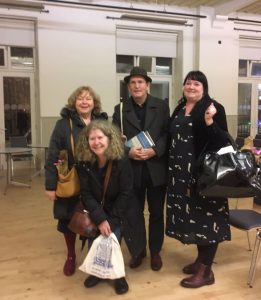My new novel, The Branchman, got a splendid launch at the Crescent Arts Centre in Belfast on Friday 16th November, alongside new works of poetry by Natasha Cuddington and Grainne Tobin, also published by Arlen House.
Introducing the novel, Belfast journalist, novelist and memoir-writer Malachi O’Doherty called it ‘a rattling good story’ that ‘more than being just a story … is a profile of Ireland at a dodgy time, a comment on who we are and where we have come from’. The full launch speech follows:


“Imagine a time in a country’s history after it has agonised for years about its place in a Union of nations. Some now feel that their vision of sovereignty has been betrayed, that they have had to settle for a shoddy compromise far short of the noble conception of a free and independent people, taking their place among the nations of the world. And others feel that the deal was the best that could be managed, and anyway, what’s done is done.
So we find the characters in Nessa’s novel in the 1920s not reconciled yet to the new Ireland, struggling to establish a country that functions with viable civic structures and a committed law abiding citizenry. All that seems a long way off. But it’s not just the failure to completely leave the UK that rankles. The previous decade has seen an uprising and three wars. The Easter Rising, the Great War in Europe, the war for Irish independence and the Civil War. One character even recalls the Boer War. And while some of the characters we meet early in this book are jaded and reduced to a maudlin pettiness, others are trying to knock the new country into shape and others still are plotting to fight on.
This is a country in which a former British soldier turned IRA man, now a detective – Mackey – has some fine skills developed in harsh conditions but also has secrets that can drag him down. One of them is that British Army past, a mark of shame in the new Ireland. Put him in a country Garda station – like the one McGahern described in the Barracks – and see if he can get any bloody work done around here as the crime rate soars. Indeed, he is only going to get the blame for that himself.
In a small Irish town, everyone knows everyone else yet no one knows anything.
Why, who’s asking?
The desk sergeant has all the gossip and no sympathy. His boss spends most of his time in the snug in the Mount and is so friendly with everyone that he can hinder investigations into respected citizens and party donors. He’s up to something.
And there is a beautiful woman, who knew Mackey in his past, up in Mayo, in the trouble times and she’s now in town.
And through all this move the secretive plotters, the killers and robbers, kidnapping and killing those who get in their way, preparing for the big one. But we’ll not give away any more than that for now.
One tends to think that historical crime fiction is a genre that starts with Conan Doyle’s Sherlock Holmes, that the rattle of cartwheels and clip of shod hooves over cobbles through gaslit mists is the perfect backdrop to crime, forgetting that Holmes was a contemporary of Doyle’s who was reproducing the world of his own day, that it is in retrospect that we are enchanted by city smog and hackney cabs. Yet the past seems the perfect place for a mystery, it is a place in which our cultural bearings don’t quite work.
Nessa is a bit more like Benjamin Black, but he takes us to more recent times in which a man might have more access to a motor car, even own one. Nessa takes us further back and recreates a world in which an investigator limps on foot, takes a train or rides a bicycle, in which calling at a woman’s door at night might bring disgrace upon her but running a police station from the snug of a bar can be indulged as normal.
We have the small town by the docks, the one hotel and bar, the doctor who does both post mortems and house calls, if he’s in the mood, and the weight of a drab culture of taking life at a slow pace and not fretting about very much lest it only lead to you having more work to do, more forms to fill in, more explanations to offer to people above you who are just as venal and lazy.
The gangster are as bad, well capable of staving your head in but sometimes just forgetting to.
So what is this book about?
It’s a rattling good story, with secret machinations, murder and jealousy and love.
But to mind mind it is about the moment in the evolution of a nation after war, and in the first fumblings of independence, before it has learnt responsibility, before it has freed up imagination and started to grow, where the possibility still exists that the independence it fought for is more than it can manage.
This book comes at a time of a great flourishing of Irish fiction.
It is daring at such a time to write genre fiction, a crime novel. To pull that off you need not just clever plotting and plausible situating, you also need to be able to conceptualize human evil and human decency both.
Who knew Nessa had such badness in her?
But more than being just a story, this is a profile of Ireland at a dodgy time, a comment on who we are and where we have come from.”
Malachi O’Doherty
Crescent Arts Centre, 16 November 2018